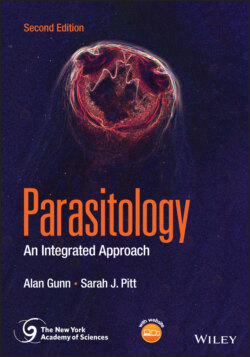Читать книгу Parasitology - Alan Gunn - Страница 22
From Welcome Guest to Villain: The Derivation of the Term ‘Parasite’
ОглавлениеThe word ‘parasite’ derives from the Greek παρά (‘para’) meaning ‘beside’ and σῖτος (‘sitos’) that means ‘food’. In Ancient Greece, the term ‘parasite’ had religious connotations and nothing to do with infectious organisms. According to a stone tablet discovered in the temple of Heracles (Hercules) in Cynosarges, the priest was required to make monthly sacrifices in the presence of parasites who were to be drawn from men of mixed descent. Declining a request to act as a parasite was a punishable offence. (Cynosarges was an area near to the city walls of Athens. In addition to the temple there was also a gymnasium, and it was here that the Cynic philosophers taught.) Subsequently, the word came to mean someone who shared one’s food in return for providing amusement and flattery. The ‘parasitus ridiculosissimus’ was a popular character in Greek and early Roman comedies and they even had joke books to help them should they run out of witticisms. The greed of the parasite was a constant source of fun for dramatists, and he was often given crude nicknames such as ‘little brush – because he swept the table clean’. Double entendres were as popular over 2000 years ago as they are today and the Latin for little brush ‘peniculus’ is also a diminutive for a penis (Maltby 1999).
An obligate parasite is one that has no alternative but to develop as a parasite of its host. On the other hand, a facultative parasite can develop as a parasite or a free‐living organism depending upon the circumstances. For example, the larvae of the warble fly Hypoderma bovis must develop as parasites of cattle and are therefore obligate parasites. By contrast, the larvae of the blowfly Lucilia sericata are facultative parasites. This is because if the female fly lays her eggs upon a live sheep, the larvae will feed on living tissue and therefore be parasites. Conversely, if she lays her eggs on a dead sheep, the larvae will feed as free‐living detritivores. Similarly, the amoeba Naegleria fowleri can live as a free‐living organism in ponds and lakes but if it enters the nostrils of someone swimming in the water, then it can become an opportunistic parasite and infect their brain.
As mentioned above, some organisms, such as the human body louse Pediculus humanus, are parasitic at all stages of their life cycle, whilst others are only parasitic at one or more stages. For example, the blood fluke Schistosoma haematobium parasitises us during its adult stage and snails during two of its larval stages but it also has two non‐feeding free‐living stages. The act of being a parasite is therefore stage specific. Some estimates suggest that as many as 50% of all known species are parasites at some point in their life cycle. However, this estimate is subject to the caveat that there is no consensus about what constitutes a species, especially among the prokaryotes. The number of known species is also a reflection of the interests of biologists in different groups of animals. For example, the fact that insects account for 72% of all known species is, at least partly, a consequence of them being studied intensively for over 200 years. In one insect order alone, the Hymenoptera (ants, bees, wasps), there are approximately 100,000 parasitoid species. By contrast, fewer people have studied mites and nematodes and the diversity of their parasitic species is probably vastly underestimated. Nevertheless, parasitism is a remarkably common lifestyle and parasites (and their hosts) exist in all the major groups of living organisms including the archaea, bacteria, fungi, plantae, protozoa, invertebrates, and vertebrates.
There is an endless debate as to whether viruses are parasitic organisms. At one level, this would appear to be self‐evident since viruses are incapable of maintaining themselves or reproducing except when within their host cell. However, being composed of complex organic molecules and having the capacity to evolve is not necessarily synonymous with being a living entity, especially when those attributes are dependent upon existing within a host cell. We will discuss this topic further in Section 2.2.
